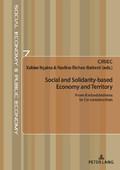Social and Solidarity-based Economy and Territory From Embeddedness to Co-construction

The articulation between the social and solidarity-based economy (SSE) and territory is not self-evident. For the contributions to this volume, the challenge was one of disentangling these interrelations by avoiding two pitfalls. The first, the idealist perspective, sees SSE as the magic answer to all neoliberalism-related ills. The demystifing perspective, by contrast, emphasizes the relentless routinization and isomorphism of SSE enterprises, which eventually end up resorting to market-oriented and/or public economy oriented models. Local case studies can extricate from this dilemma. Close observation of complex local configurations where public, private, associative and cooperative actors and issues are deeply entangled, enables to achieve a nuanced understanding of the territorial dynamics of the SSE. This book is the result of the International Ciriec working group on SSE and territory. It emanates from an interdisciplinary dialogue conducted among researchers from nine countries and two continents, Europe and America. If contexts vary from one country to another, the contributions underline the capacity of SSE to elaborate original inputs to social, economic and sustainable local development. Based on original case studies, the contributions illustrate different strategies of SSE organisations in their respective territories. SSE provides an innovative answer to changes in socio-economic and political regulations, by promoting new forms of territorial cooperation. Despite the differences between the case studies, all the chapters of this book contribute towards a balanced approach to the territorial regimes of the SSE which interweaves socio-economic approaches to local and community development, analysis of SSE governance, social mobilizations and territorial policymaking.
